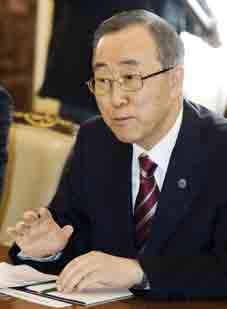Two Russian trucks explode in Abkhazia
By Temuri Kiguradze
Wednesday, February 11

The Abkhazian version of events is that the explosion was caused by a radio-controlled bomb planted by “Georgian special forces.” The de facto Abkhazian Internal Ministry described this explosion as part of “non-stop terrorist activity” from the Georgian side. The Georgian media confirmed the fact of the explosion but stated that it happened due to “incorrect stacking of weapons” in one of the trucks, which caused them to detonate spontaneously. “The explosion [in the first vehicle] was so strong that the second truck detonated as well. Russian soldiers died,” states the Georgian Interpressnews news agency.
The continual incidents and provocations on the territories of the Georgian breakaway regions were one of the topics of the UN Secretary General’s special report, prepared for the negotiations over the status and prolongation of the UN observer mission in Georgia. Ban-Ki Moon proposed a five-point initiative to establish an “effective security regime” in Abkhazia in his report of February 5:
• Strict observation of the ceasefire on land, at sea and in the air, and refraining from hostile actions;
• To ban presence of armed forces and equipment in the “security zone” – a 12km area on each side of the Abkhaz administrative border, which was envisaged by the Moscow agreement. The measure will only allow presence of law enforcement personnel of no more than 600 on either side, armed with personal and side arms in this area. Creation of a zone equivalent to the “restricted weapons zone” – larger than 24 km-long security zone, which was envisaged by the Moscow agreement, on each side of the administrative border, where heavy military equipment would not be allowed, including tanks, armoured personnel carriers, all types of artillery and mortars;
• A ban on overflights by military aircraft and unmanned aerial vehicles in the zones described above;
• Advance notification of any changes in the deployment of armed personnel and equipment in the zones described above;
• Designation by each party of authorized representatives who, including through UN facilitation, would liaise on both a regular and ad hoc basis to exchanging information, preventing tensions and resolving incidents.
Ban-Ki Moon also stated that “the foregoing elements do not constitute a comprehensive security regime, nor should they prejudge in any way agreements reached by the parties. However, they could serve as a basis for discussions between the parties on such a regime, which I hope can be developed and finalized without delay, with the strong encouragement of the Security Council.”
Commenting on this proposition Georgian State Minister on Reintegration Issues Temur Iakobashvili stated that its points are “quite discussable.” “The Georgian Government is ready to start negotiations on these recommendations, however this will be done only after it becomes clear who will be the guarantor for the fulfilling of the obligations taken by the sides. Georgia proposed international police forces as the guarantor a long time ago,” stated the Minister, speaking to The Messenger on February 10.
Georgian independent political and military analyst Koba Liklikadze considers that the UN recommendations will be acceptable for Georgia because before the August conflict Georgia abided by the Moscow agreement, which made almost the same demands upon it. However he also considers that even Russia might agree to this new security arrangement without posing major problems. “The 12 km zone is not a big priority for Russia, the priority was the Kodori Gorge [the only Abkhazian territory controlled by the central Government before August war]. Now they control the Gorge and may agree to withdraw several kilometres. That may be quite beneficial for the Russians, as the international community will treat this as a sign of good will from the Kremlin and it may thus temporarily draw their attention away from the major problems in the breakaway regions,” Liklikadze told The Messenger.
